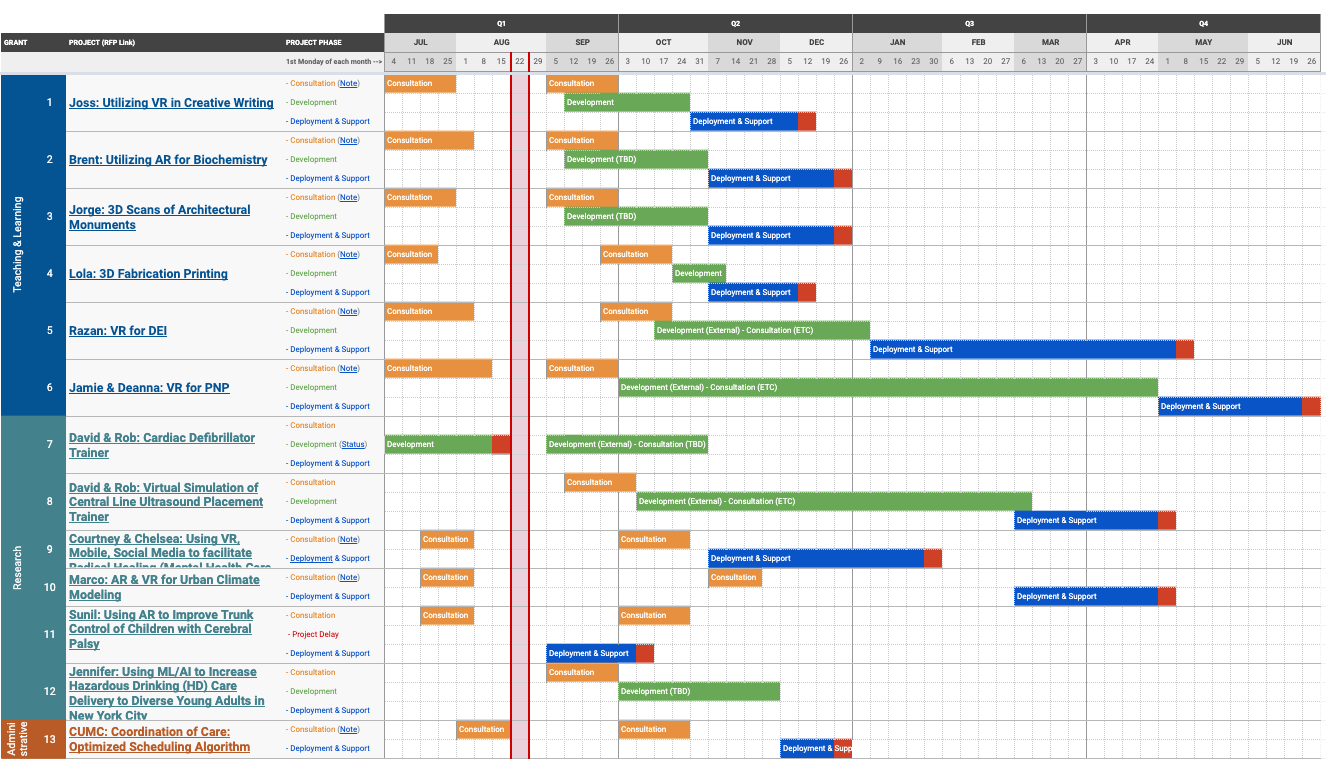Evolution of Emerging Technologies Consortium
Evolution of ETC
Emerging Technologies Consortium (ETC) is a central office for Columbia University’s emerging technology initiatives and a hub for facilitating the development of innovative solutions that unitize next-generation technologies, engagement in industry partnerships and collaborations, and multidisciplinary applications across the university.
Sponsored by CUIT, the group was formed in 2017 and has helped facilitate the exploration and understanding of the adoption of new technologies at Columbia. The membership has dramatically increased from a dozen thought leaders at inception to over 1,000 participants and 40 managing members who actively contribute towards the goal. These members, from multi-disciplinary backgrounds ranging from the arts to engineering, include students, researchers, administrators and members from Columbia affiliate organizations.
ETC’s core mission is to lead its peers in the adoption of emerging technologies for advancements in teaching and learning, research, and administration initiatives at the university. These technologies include XR, VR, AR, 3D printing, robotics, artificial intelligence, machine learning and more.
In addition to building a culture in the Columbia community that fosters new ideas, technology, and innovation within an ecosystem of collaboration, ETC works with industry partners to host the Future of Technology in Higher Education Summit, demo days, webinars, and other student engagement events. Seasoned industry executives, educators, researchers, and other students have gathered on campus to discuss a variety of topics, including quantum and spatial computing, cyber-physical human systems, data science, and eSports.
Breadth and Depth of ETC Projects
Through the Campus of the Future initiative, ETC promotes the Columbia community's adoption of cutting-edge technologies and provides emerging technology grants. ETC supports faculty, researchers, and administrators in their efforts to develop applications using emerging technologies in their course designs, research studies, and administrative projects. These efforts benefit from the involvement of internal collaborations within the Columbia University network (e.g., with the Office of the Provost) as well as external ones (e.g., industry partners such as HP and AMD).
Grants for emerging technology projects have been provided to the inclusion across domains and disciplines, including;
- Architecture, planning and preservation
- Biological sciences and chemistry
- Computer science
- Creative writing
- Diversity, Equity, and Inclusion (DEI) concepts
- Engineering
- Medical education
- Nursing education
- Occupational Therapy education
- Social work and Global Health
Please visit the latest emerging technology projects for Teaching and Learning, Research, and Administration to learn more about the breadth and depth of ETC projects and engagements.
ETC’s Approach to Project Management
Every academic year, ETC manages well over 15 emerging technology grant projects across Columbia's twenty-plus schools, including 4 undergraduate schools and 16 graduate schools.
As a model for reframing methods and outcomes of projects, ETC applies design thinking methodology and its four qualities: human-centered, possibility-driven, option-focused, and iterative. Design thinking goes hand in hand with the agile methodology, which allows changes to be made quickly, assumptions to be challenged, and projects to adapt to new information or evidence. It is an iterative non-linear process that emphasizes the process of implementing a solution through empathy, ideating, prototyping, and testing.
ETC has employed teams that are constantly measuring, gleaning insights, and optimizing to meet user needs to help members of a project embrace innovation and creativity, while also making decisions based on user needs. ETC’s visual timeline allows the teams to see achievable timelines and details about each phase as well as project dependencies.

Applying retrospectives, lessons learned, and post-project evaluations, ETC pinpoints areas of improvement for the following academic year. This data can help highlight the highs and lows of prior performances and be a valuable tool in underscoring the benefits of successful practices or bringing areas of weakness to light.
Emerging Technologies Consortium is thriving with much more to come. Efforts have been underway to create and strengthen a collaboration with several industry partners to provide broad support of funding opportunities, equipment, and expertise to the Columbia community and New York City communities. ETC currently has a membership of more than 1,000 faculty, researchers, students, and administrators.